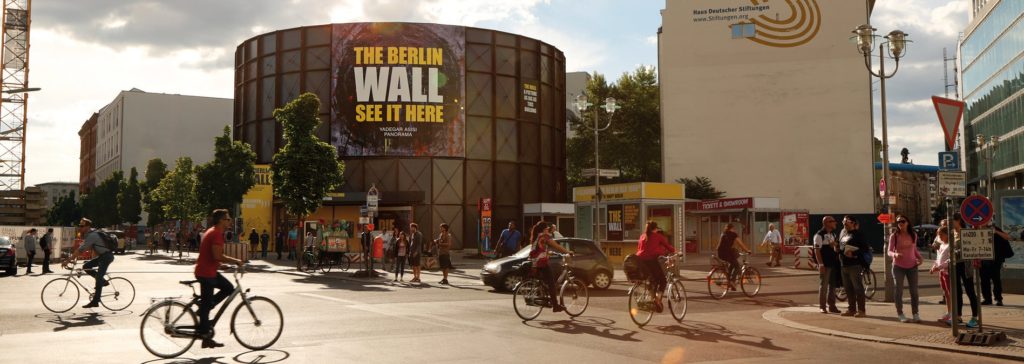
Last month, I returned to the Berlin Wall. It was nearly gone the first time I saw it, but now almost every vestige of its horror has been erased. With a key exception: the Asisi Panorama – a museum that feels like time travel back to the dark days of the Cold War. In the atrium, you can read uplifting quotes from the likes of East German dictator Erich Honecker:
Securing the border is the sovereign right of each and every country – this includes our German Democratic Republic. The Wall will still remain in place in 50 and even 100 years, if the reasons for its existence have not been eliminated. (January 19, 1989)
Almost everyone sees the Berlin Wall as an unmistakable sign of evil. So do I. What puzzles me, though, is why so few people wonder, “Why aren’t other countries’ walls morally comparable?” The standard answer, of course, is that decent countries build walls to keep people “out,” while East Germany built the Berlin Wall to keep people “in.” But this is a lot of moral work to hang on two prepositions.
Suppose, for example, that the East German government closed its airspace to Western aviation and used the Berlin Wall to prevent anyone from leaving the surrounded city of West Berlin. Honecker could have even told his citizens, “You’re free to move to West Berlin, but since we’ve got it surrounded, don’t expect to enjoy too many Western luxuries.” Despite his oppressive intent, Honecker would, grammatically speaking, be keeping West Berliners out of East Germany, not holding East Germans in East Germany.
To make the hypothetical even starker: Imagine the East Germany government legally granted independence to a one-mile strip of land along its entire border. Call it Mauerland. All of the citizens of Mauerland are former officers of the East German border guard; their country is just one big, deadly wall. East Germany then abolishes all laws against emigration; everyone is free to leave. Unfortunately, the sovereign state of Mauerland refuses to grant visas or overflight permission to anyone without the East Germans’ approval. When challenged, they say, “Mauerland, like the United States, has every right to keep foreigners out. You keep out Mexicans. We keep out East Germans.”
The obvious reply is that the U.S. is a democracy and Mauerland is a dictatorship. But not so fast. If the citizens of Mauerland are a few hand-picked veterans of East Germany’s ruling Socialist Unity Party, they could calmly adopt a scrupulously democratic constitution – then freely elect a government that keeps East Germans out. Sure, this preserves the power of their fraternal ally, but don’t all democracies make sleazy deals with dictatorships?
Faced with this hypothetical, you could challenge East Germany’s right to create Mauerland in the first place. Governments do not legitimately own all the land inside their borders; that rightfully belongs to individual property-owners. To make Mauerland happen, the East German government would have to trample their rights, exiling politically unreliable people from the border zone. (Indeed, that’s what the East German government actually did).
If you take this intellectual route, however, conventional immigration restrictions also come under suspicion. The top reason countries restrict immigration is to stop native employers, merchants, and landlords from consensually trading with foreigners without government permission. Unless governments legitimately own all the land inside their borders, what right does any government have to interfere with these transactions?
Alternately, you could accept governments’ ultimate ownership of all the land within their borders, but then add that “Property is not absolute.” If someone has to run across your land without permission to save his life, he’s entitled to do it. The same goes if you sadistically use your property rights to trap someone in desperate poverty. Just because you own it, doesn’t mean you’re entitled to use it to inflict great harm for trivial gain.
This route, too, however, places immigration restrictions under suspicion. Why? Because they also inflict great harm on would-be immigrants for trivial gain. How would you like to be trapped in Haiti?
When I think about the Berlin Wall, am far more appalled than when I think about the U.S. wall with Mexico. I freely admit it. In part, I feel worse because I think it’s far worse to be trapped in East Germany than to be trapped in Mexico. In part, it’s because I detest Communism to my core. In part, it’s because Communists victimized my immediate family. But the main reason is hedonic adaptation; the more familiar an evil becomes, the less bad it feels. Still, I’m not someone to let me emotions cloud my thinking. Whenever I see a border wall, I always see the Berlin Wall. And when people casually remark, “Our walls our fine because they keep people out, not in,” I shake my head at their thoughtless refusal to see – or even ponder – the fundamental similarities.



READER COMMENTS
JoeMac
Sep 11 2018 at 1:54pm
You state:
On what grounds do you make this claim? Who says people have a right to property?
National borders, like property and contract and everything else, are entirely arbitrary social conventions. And just as everyone believes it is acceptable for government to regulate property and contract, so too do they believe government can and should regulate borders in the interests of their people
Therefore, if you want to win the argument over open borders, you must first win it with respect to property and contract, which you have entirely failed to do.
This is exasperating. 🙂
Philo
Sep 11 2018 at 6:43pm
“Property and contract . . . are entirely arbitrary social conventions.” Nonsense! Property and contract are hugely beneficial social conventions (thus not “entirely arbitrary”), without which human society could not thrive.
Joemac
Sep 11 2018 at 7:38pm
I’m not arguing against their utility. I’m arguing against the claim that it’s obvious that people have a moral right to land ownership.
Swami
Sep 11 2018 at 2:46pm
I agree completely with the value and benefit of people leaving oppressive regimes. I agree it is in general beneficial to allow employers and prospective employees the freedom to work together.
The problem is that a nation state as currently designed is based upon the consent of the governed. Formal laws and institutions are based upon informal norms, beliefs, shared myths and protocols. This creates a good old fashioned dilemma. If you allow unrestricted immigration of who makes up your society, it is entirely possible to lose all control of what your society is. This is especially true of liberal order societies such as seen in the West
Amsterdam with primarily people raised in the Netherlands is completely different in every way than an Amsterdam with a sudden influx of twice as many people (3 times the population) from a different continent, with a different religion, with limited education, different norms, expectations, values, beliefs in right and wrong, and so on.
This truth is indisputable. No rational and honest adult could argue with it. The only response to this argument is the empty hope that it would not come about (let’s assume we open all borders and very few actually come, even though homeless people in Amsterdam have higher living standards and quality of life today than full time workers in parts of Africa and SE Asia)
Thus the Achilles Heel of truly open borders is not economic it is political. An open borders modern liberal state would quickly revert to a non liberal order based upon the twin forces of influxes of radically non liberal people and the conflict and chaos of the original inhabitants struggling to coordinate with the now larger population alien newcomers.
Thus open immigration in the modern era with cheap air travel and global communication is self undermining. Therefore we need to instead design liberal alternatives. These could include open border zones, charter cities, and clear merit based systems to immigrate (college degree, fluency in language, job offer,etc).
Arnold Layne
Sep 12 2018 at 7:35am
Couldn’t have said it better myself. Cultural degradation is the Achilles heel of the open borders movement.
Kevin L
Sep 12 2018 at 3:35pm
If this is such an Achilles heel to the open-border argument, why is it that New York City’s culture is not overrun by poor Southerners? Or why doesn’t Texas impede the flow of California’s refugees?
But on a more philosophical note, this argument requires that there is such a thing as a culture, and that it is somehow collectively owned. This would mean that, as part owner of the intangible culture I live in (by choice or by complacency), I have a right to expect certain behavior of my neighbors. That is, if you are my neighbor and also member of our common culture, you cannot drastically change your habits or behaviors (or beliefs?); nor can you transfer your right to be physically near me to someone whose habits or behaviors are drastically different from yourself.
That is hardly better than the illiberal, bourgeois-stifling attitudes that have prevailed in most of human history.
Swami
Sep 13 2018 at 12:08pm
Kevin,
“If this is such an Achilles heel to the open-border argument, why is it that New York City’s culture is not overrun by poor Southerners?”
It can be and often has. Are you not familiar with the cultural changes that happened to Northern cities as poor southerners moved North in the early 19th C? However, as different as the cultures were, they still shared centuries of shared history, language, customs, norms, myths and Schelling points. The impact of immigration on shared culture is a factor of the rate of immigration proportionate to the population size, the differences between the two cultures and the propensity of the two to assimilate with each other.
“But on a more philosophical note, this argument requires that there is such a thing as a culture, and that it is somehow collectively owned. ”
If you deny the existence of culture, we are probably too far apart to have a legitimate discussion. Nothing in my argument requires collective ownership of culture. The argument is that if too many people enter with a vastly different and incompatible cultural beliefs, values, norms and Schelling points that cooperation will become dysfunctional and that the institutions building up on that culture will be undermined. It could also occur if too many people changed culture at one time, but this is unlikely as cultural conformity is self reinforcing.
These are not novel ideas, they are well developed in the writings of North, Mokyr, McCloskey, and two or three dozen others experts on the issue of formal and informal institutions.
“That is hardly better than the illiberal, bourgeois-stifling attitudes that have prevailed in most of human history.”
Kevin, I am trying to preserve liberal culture from the rash, naive ramblings of people who are too blind to see that an open borders policy is virtually certain to destroy any culture silly enough to adopt it in a modern setting. If you are wrong, you will destroy institutions of modernity and our lives along with it. No reasonable person would take this type of existential threat without first testing it in a small way and expanding slowly from there.
If you are arguing for some place to volunteer to risk existential threat to allow unmitigated open immigration of all comers to see what happens (I will give good odds on all heck breaking loose), then count me in (as long as it is far away from my home). I already suggested superior liberal ideas at ways to open up liberalism and freedom in ways that don’t threaten liberal institutions. Please re read them.
Honestly, you and Brian are making the reverse naturalistic fallacy. You think the world ought to work better with open borders so you are reorganizing reality in such a way that you dismiss the obvious problems and existential threats that come with the idea.
Swami
Sep 13 2018 at 12:11pm
Oops. The influx of Southerners to northern cities was of course in the 20th C, not the 19th. Sorry.
Joe D
Sep 11 2018 at 4:25pm
Shorter version: Does a wall to keep people in have the same moral standing as a wall to keep people out?
Answer: No. Suppose the wall on the southern border had been put up by Mexico, to keep its people in. To force them to remain Mexicans, in other words. That would be comparable. But a nation’s sovereignty includes, necessarily, the right to control its own borders coming in.
Or, should we not have customs and passport controls at airports either?
corvidorum
Sep 11 2018 at 6:26pm
Yes, an awful lot hangs on those two little prepositions.
If I lock my doors to keep strangers out of my house, I’m a responsible homeowner.
If I lock my doors to keep strangers in my house, I’m a monster.
Same house. Same doors. Same locks. Huge difference.
Ethically speaking, keeping out and keeping in are analogous to declining to give aid yourself and preventing others from doing so. You aren’t obliged to dive in to rescue a drowning man, but you sure as hell shouldn’t stand in the way of anyone else who is willing to.
Thus, the abhorrent aspects of Mauerland are those which keep people in East Germany, not those which keep people out of Mauerland. Permitting overflight, issuing transit visas, or providing a secure corridor to the outside world would all be acceptable ways to remedy the situation without meaningfully sacrificing any of Mauerland’s border integrity.
Because the evil of Mauerland isn’t the denial of access to it’s own land, it’s the denial of access to other (perhaps more welcoming) territories. Neither of those things is a necessary consequence of the other, or of the presence or absence of a border wall.
So the question isn’t whether there’s a wall at the border, or whether people are allowed to freely enter the country, but whether the practical result is that people are prevented from freely accessing the hospitality of other countries.
For the southern border, the answer is clearly no. Regardless of any wall, people in Mexico are free to enter the US if they have a valid visa, or else are free to travel by land or sea or air to any other country in the world who will have them.
Kevin L
Sep 12 2018 at 2:03pm
“Because the evil of Mauerland isn’t the denial of access to it’s own land, it’s the denial of access to other (perhaps more welcoming) territories. Neither of those things is a necessary consequence of the other, or of the presence or absence of a border wall.”
Yet isn’t the US border overwhelmingly preventing employers or others in the interior of the US from voluntarily trading with foreigners? Do you think that the de facto owner of the US border and ports (the US government) owns the enclosed property as well?
“So the question isn’t whether there’s a wall at the border, or whether people are allowed to freely enter the country, but whether the practical result is that people are prevented from freely accessing the hospitality of other countries.”
But why is it the country that is morally relevant? If I lived in Kansas and wanted to show hospitality to a Mexican person but the US government won’t allow me, how is that morally different from the US government preventing someone in Canada from showing the same hospitality?
“Regardless of any wall, people in Mexico are free to enter the US if they have a valid visa…”
I take it you don’t see the contradiction between “free to enter” and “valid visa”.
corvidorum
Sep 12 2018 at 5:24pm
The difference is that the US government is merely a representative of the US public, and the US public absolutely has the moral right to control access to their collective territory.
The US government doesn’t own the borders or the ports. It simply administers them on behalf of the US citizenry according to policy which is (at least in theory) a result of the collective will of US voters expressed through the political system.
You are absolutely correct that it’s wrong for person A (the government) to unilaterally control person B’s (foreigners’) access to person C’s (US citizens’) property. But in this case, person A isn’t acting unilaterally, instead they are acting on behalf of person C, in accordance with person C’s will. Similarly, if a hotel employs a security guard, the guard is justified in denying entry to non-guests, even though he doesn’t own the hotel himself, because he is simply enforcing the owner’s will.
You may object to the outcome of the political system, but by participating you agree to abide by it, thus the border policy is still representative of your will even if it isn’t your actual preference.
No, the freedom to enter isn’t absolute, it is qualified by the possession of a valid visa (that’s what the word ‘if’ was doing in there).
This is consistent with the idea that you have the right to enter someone’s property if and only if you have their permission. Loosely speaking, the USA is the property of the US citizenry, and the visa process is the means by which the citizenry gives their permission for foreigners to enter.
A Country Farmer
Sep 15 2018 at 5:29pm
Mild constructive criticism: The last two blog posts have had a few grammatical errors whereas I don’t remember this happening in the past. The topics are still great!
Comments are closed.